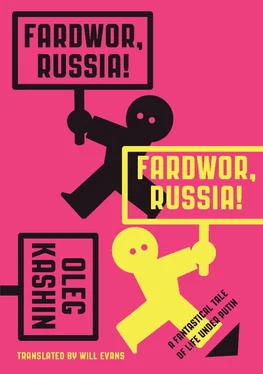In reality, of course, that’s not at all how things really were; and if Kirill, catching up on his sleep on flights between Hong Kong and London and blushing before Prime Minister Putin at glitzy crisis management meetings, carried the whole business on his shoulders, then Mefody was a clueless and selfish rich slacker who would spend half the year traveling around far-off countries (Bhutan, Nepal, all the way to Colombia) and the other half sitting around in his personal castle in the village of Barvikha in the Odintsovsky region of Moscow Oblast. Mefody would most likely have been deserving of more than a few of the dirtiest curses, if not for one convincning reason, which he, of course, possessed, and which Vasya encountered when the security guard delivered him to Mefody’s castle and, having opened the door into an enormous study, left him alone in the dimly lit chamber.
The study was empty, or so it seemed to Vasya. On the walls hung two paintings—a portrait of a gloomy Caucasian with graying temples, dressed in royal robes (Vasya can be forgiven for not recognizing either the late Arkady Magomedovich or the brush of Ilya Glazunov) and a black square in a glass frame. At the end of the study stood a table with no one behind it, and Vasya took a step forward, assuming as he approached the table that somebody would surely be coming in; but the moment the former midget took his first step, a squeaky voice greeted him from somewhere off to his right. Vasya turned his head and saw a couch with an unpleasant-looking midget in a silk dressing gown reclining on it.
“Hello Vasya,” the midget said. “Not a centimeter over ninety,” Vasya thought to himself as he returned the greeting.
ARKADY MAGOMEDOV WAS buried in the godless Russian style for a good reason. He had tried to determine his relationship with God many times (both in jail and after), but the only thing he understood was that he had already received his punishment in the form of his son, the freak, therefore he had nothing else to worry about. He loved Mefody very much, and Kirill (there was a two years’ difference between the sons) knew from a very early age that because his younger brother was not growing, anyone who offended him was an enemy, and Mefody himself was near and dear, and whatever happened later in life, Kirill needed to do everything that he could to ensure that his brother would never doubt his own integrity as a human being for a second.
They were abroad when the news about their father’s death reached them; both were in America: Kirill in Boston, Mefody in Miami. That only one brother would go back for the funeral was never called into question, but Kirill felt uneasy when, talking on the phone with Mefody, instead of the proper words of condolence, the first thing his brother asked was how to say in English, “ Za moi zhe pryaniki ya eshche i pidoras. ” While Kirill was on the plane from Boston to Makhachkala, he was wondering whether his brother would want to split up the company, contrary to their father’s last wishes—in principle, finding himself some strong allies somewhere in the corridors of the Kremlin or even in rival firms wouldn’t be hard to do, and about Mefody’s character, Kirill by then had become convinced: he was a freak through and through. But it was a false alarm; his younger brother seemed not to have even noticed his father’s death. When he got back to Moscow, he signed over to his brother the power to control the business, and then kept on nibbling away at the family fortune as much as his little midget’s appetite could handle. And Kirill, although he tried to emulate his father by remaining in the shadows, quickly turned into a celebrity throughout Rublyovka—there aren’t so many young, handsome, unmarried billionaires in the world. Millions of girls and some lifestyle columnists stood by in the hopes that Kirill would decide to finally marry, but a year went by, and then a second, and then a third and fourth, and the bachelor’s reputation became an important part of the head of Vremya corporation’s image. All it took was for him to give another interview, answering the same old questions, saying something like, “Sex and humanism are not comrades” or “You don’t bang your blood,” and the rumors would start to circulate around Moscow with a redoubled intensity that Kirill Magomedov was gay or some sort of terrible pervert. Someone even said that he would hire prostitutes for some insane amount of money, drag them to his place, undress them, sit them on the grand piano (why a grand piano?), and with one hand would play Soviet songs while masturbating with the other.
Meanwhile, for some reason there weren’t any rumors about Mefody, though he, of course, deserved them; but, obviously, the idea of a midget-billionaire was too much even for the most elite circles of Moscow. It’s possible that even if some tabloid wrote that the co-owner of Vremya -Kapital was a midget, no one would believe such a tale. A pedophile, a drug addict, a fascist? Fine, no problem… but a midget—that’s just absurd.
Mefody, it seemed, had gotten used to being such an absurdity long ago, this role fit him fine—so, at least, it seemed to Kirill, and also to Slava, a young retired FPS captain who served Mefody in the role of an aide, who had at one time served as the security to Patriarch Alexy, and was now responsible for Mefody’s everyday comfort. They spent a lot of time in conversation together; Mefody loved to listen to stories about the patriarch’s everyday life, especially about when the patriarch had died at his dacha in Peredelkino. Slava told the stories with pleasure, and then he would go report to Kirill in his office on the next-to-last floor of the Federatsiya tower; he told him honestly that everything was alright and that Mefody wasn’t planning any kind of takeover or attempts on his brother’s wealth.
Mefody, devil take him, really wasn’t planning any kind of takeovers, he sincerely loved his brother, and regarding his troublesome personality—you’d act that way too if you had to live for even a few hours with such a deformity. Mefody tried not to think about what might happen to him the next day, or a week from now, or after a year, but when, flipping through the channels, he came upon Malakhov shouting something about some midget who had mysteriously grown, he immediately called Slava and ordered him to find this developed midget and bring him to Rublyovka right away.
While Vasya was being brought to Barvikha, Mefody ran around his study from one end to the other, and by the time Vasya showed up he had gotten really tired, so the sofa and the pose hadn’t been planned; the fact is, he really couldn’t stand on his own two feet from fatigue and, yes, from excitement as well. Yes, there was a ninety percent chance that this whole story about the growth was a complete fabrication from beginning to end, but if there was even a microscopic chance that Vasya really had grown in the course of two weeks, then he, Mefody, would manage to shake the secrets out of Vasya and then use them to make himself grow. He had never really given it a thought, but this really was Mefody Arkadievich Magomedov’s greatest dream.
Vasya, of course, wasn’t about to spill Karpov’s secret to the first person he met, but the first person he met started talking about money, and Vasya screwed up his face for a second, then exhaled: “Five thousand dollars.” He felt scared; the sum seemed incredibly large. But Mefody silently got up from the sofa and without a word stepped up to his table on his little feet—tap-tap-tap—took an envelope out of the drawer:
“Here’s ten,” and waved it in Vasya’s face. “Talk.”
Vasya told him everything he knew: the man’s last name was Karpov; he didn’t know where he lived or where he worked; his cell-phone number was this and that; his address was such and such; one intravenous injection and a recommended diet; and he didn’t take any money for the injection.
Читать дальше




![Stephan Orth - Behind Putin's Curtain - Friendships and Misadventures Inside Russia [aka Couchsurfing in Russia]](/books/415210/stephan-orth-behind-putin-s-curtain-friendships-a-thumb.webp)






